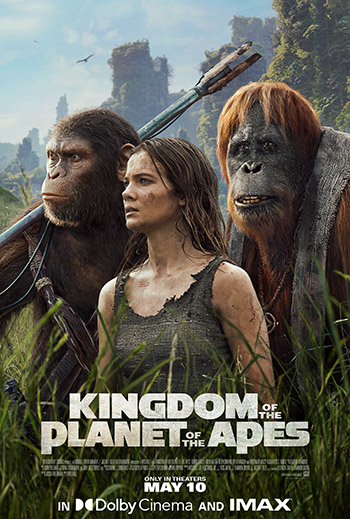Movies

New Releases • A-D • E-H • I-P • Q-Z • Articles • Festivals • Interviews • Dark Knight • Indiana Jones • John Wick • MCU
Go behind the scenes of Kingdom of the Planet of the Apes with star Freya Allan
Featurette: 20th Century Studios
Kingdom of the Planet of the Apes
Directed by Wes Ball
Rated PG-13
Reigned 10 May 2024
#KingdomOfThePlanetOfTheApes
The visuals are stunning, but the story lacks punch.
Render Unto Caesar

Watching the latest installment of the Planet of the Apes series is a little more interesting when put in the context of this post-pandemic world that’s adapted to life with COVID. Given it’s been seven years since the last Apes movie was released, a title card reminds viewers of the premise behind the current strain of this long-running series. There was a man-made virus that spread around the world. Originally intended to be a cure for Alzheimer’s, the drug morphed into a deadly menace that dumbed-down humans while escalating the intelligence of simians.
The first movie in this “modern” series, Rise of the Planet of the Apes, was released in 2011. Back then, the bird flu was a major global threat. That was followed by Dawn of the Planet of the Apes in 2014, then War for the Planet of the Apes in 2017.
Consider that series of three movies the Caesar trilogy. Kingdom picks up “many generations” — a couple hundred years — later. It’s a lengthy setup detailing various cultural aspects of simian life and it takes a while before a human is introduced. That’s Mae (Freya Allan, The Witcher), who’s called Nova by the apes.
The opening is clearly intended to drive an emotional bond with the new lead ape, Noa (Owen Teague, It), as he and his friends go on an eagle egg hunt in preparation for a bonding ceremony. Their tribe and the eagles have forged a relationship. But there’s conflict between ape tribes and Noa goes on the run in a fight for survival.
Gorillas in the Midst
In the Caesar trilogy, there are lines of dialogue (“Get your hands off me, you damned dirty ape!”) and names, such as, obviously, Caesar, and nicknames, including Bright Eyes, to serve as a bridge back across the decades to the original movies from the 1960s and ‘70s.
Now, the name references continue (Nova, which also played into War), but Kingdom is also more visually in tune with original Planet of the Apes.
Once Mae/Nova is introduced, things start to pick up. The story’s timeline starts to gel with the look and feel of the original Planet of the Apes, released in 1968. There’s Nova, being hunted by armed gorillas on horseback, chased through fields of tall grass. There’s the creepy, intimidating blowing of horns as the gorillas begin their pursuit. The haunting scarecrows. An oceanside setting, with waves crashing against the flat, sandy beach then the sight of the dilapidated remains of a human history long forgotten.
That’s when Kingdom is at its best. That’s when the movie evokes the original’s great sense of a world gone awfully, miserably awry.
But then the story devolves and it starts to play a bit like Beneath the Planet of the Apes.
There’s a giant armored gate off the beach where Proximus Caesar (Kevin Durand, Abigail) has established his titular kingdom. He wants to get inside and — in his mind — expedite the course of evolution by absorbing all the knowledge it contains. Given the fate of the world, it’s a broken logic that could at best bring things to some sort of tentative par, but could also expedite the decline of the tattered planet.
Aiding and abetting Proximus’ hunger for knowledge is a human named Trevathan, who’s perfectly content reading Roman history to Proximus. William H. Macy makes a surprising — almost unlikely — appearance as Trevathan, but this series has always held a considerable pull to the stars. Charlton Heston in the very first movie has more recently been followed by Gary Oldman, James Franco, John Lithgow and Keri Russell.
Ape Shall Not Kill Ape
Kingdom of the Planet of the Apes is packed with eye-popping effects. The ape animation — which has been top notch throughout this modern series — is next level here, pushing ever-closer to photorealism. And there’s a surprising sense of the movie striving for an emotional complexity, which is a continuation of the themes found in the Caesar trilogy, particularly regarding the coexistence of apes and man.
But that’s also been part of the problem with the Caesar trilogy and Kingdom. As well-crafted as the movies are technically, they lack an element of fun found in the original movies. The humor is there, but it can be hard to find.
And all of this sets Kingdom up with its fatal narrative flaw: it’s not clear what’s at stake. The world’s already been destroyed and, for the bulk of the movie, there’s only one human to care about, Nova. Kingdom is so ape-heavy (and in some respects heavy-handed), the human connection is extremely thin.
Nonetheless, Kingdom makes its way to an ending that opens up a fresh round of possibilities. Perhaps there’s a new trilogy in the offing and maybe the next chapter will turn the corner and restore a sense of fun — and purpose — to the series.
• Originally published at MovieHabit.com.


